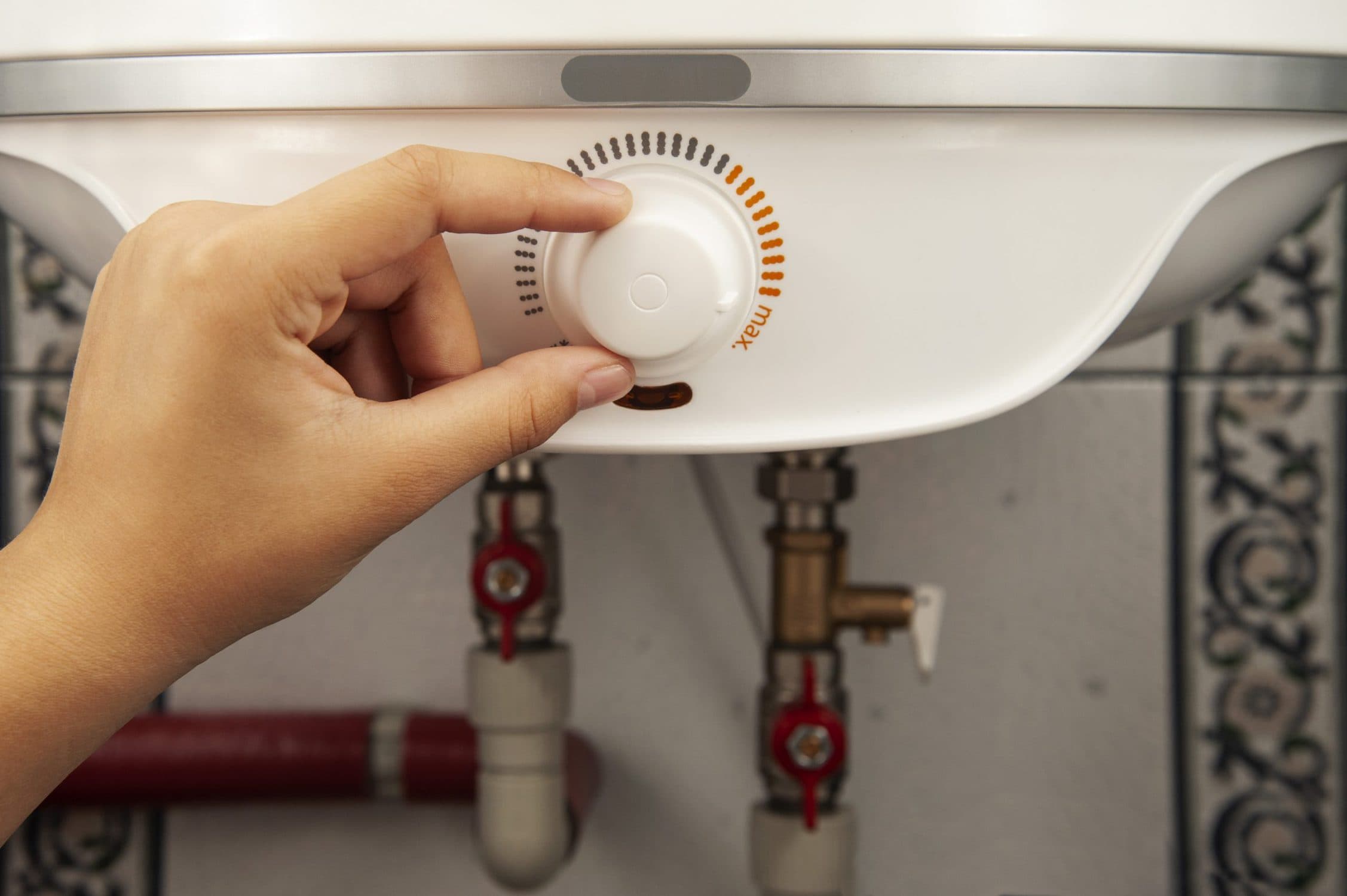
Heated water has been around as long as humankind although the method has varied. If you’ve ever wanted to know more about these products, you’ve come to the right place.
Settle in or skim around to find out how to choose the right one, which brands come out on top, how to maintain one, and the types out there on the market.
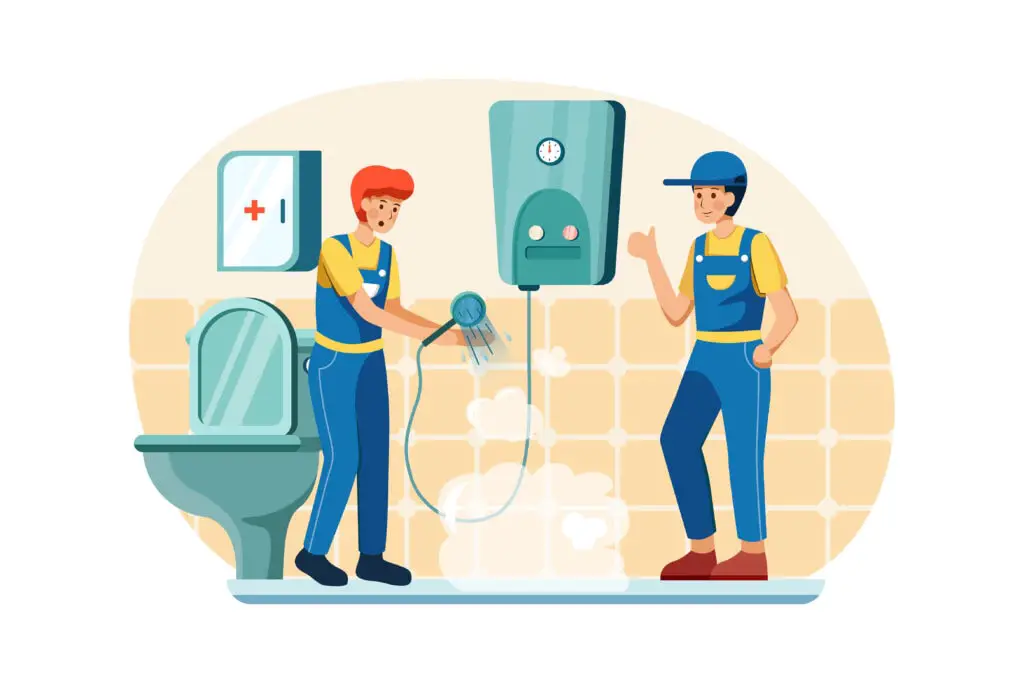
You can also click on our table of contents to get to move around faster.
Water Heater Basics
What is a Water Heater?
A traditional water heater is a large metal cylinder that holds a specific amount of water. These are often kept in a closet, basement, or laundry room to keep them out of sight.
Simply put, a water heater contains a heating element which increases the temperature of water to a specified measurement. We then use this heated water for cleaning, cooking, and bathing.
How Does a Water Heater Work?
How exactly does a water heater work? Here’s a short explanation.
All water heaters contain a thermostat which dictates the temperature water will be heated to (typically between 120-180 Degrees F).
In traditional water heaters, cold water enters through a dip tube where a heating element or burner activates and remains on until the water reaches the specified temperature.
Once it reaches the compressor, the gas is squeezed under high pressure where its volume is decreased.
The heated water rises to the top and exits through a heat-out, or outlet, pipe to the appropriate open tap. The burner or element turns on periodically to keep the water at a set temperature until needed.
Tankless water heaters are becoming increasingly popular and work without storing large amounts of water. This process heats water as it passes over the heating element or burner, which decreases the flow rate of hot water. However, you never waste energy by heating water that isn’t being used and never run out of hot water.
The downside is, if several sources are using hot water at once, the flow will slow considerably and the tankless water heater may not be able to keep up.
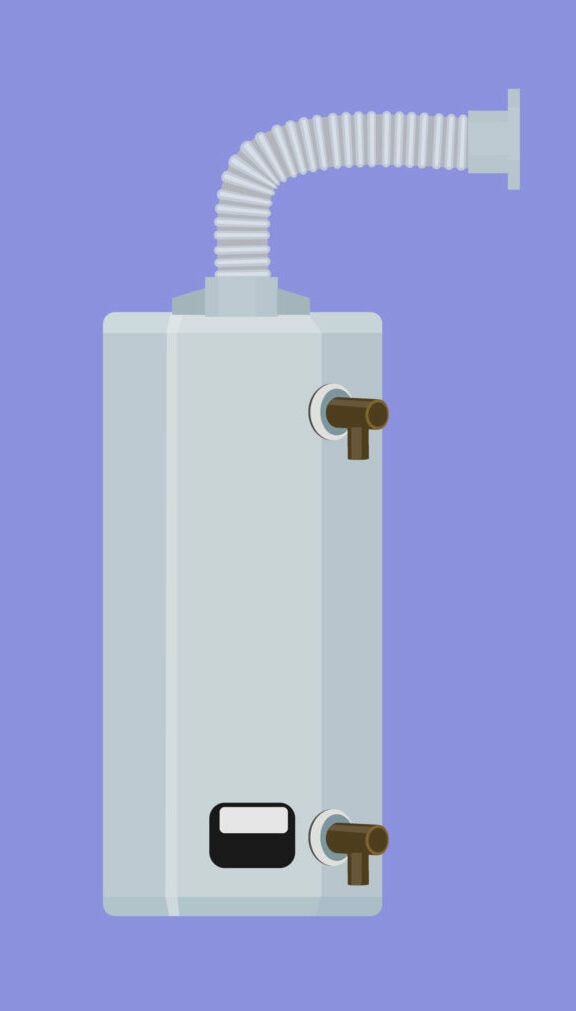
Types of Water Heaters
There are actually quite a few types of water heaters you can buy. Each has its upsides and downsides but all are made to do one thing: bring you hot water when you need it. Here are five of the most common types.
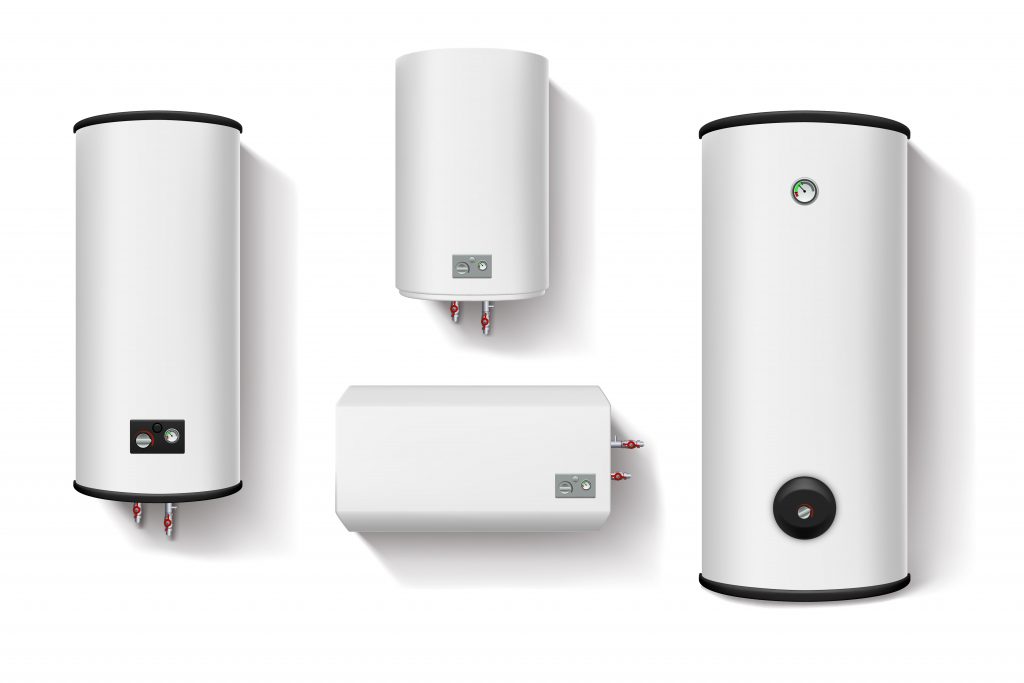
Conventional
The most recognizable type of water heater is the conventional type. As discussed above, these have a large tank that stores water, which is heated by either an electric heating element or a gas burner.
Tankless
Tankless water heaters are a great option if your hot water needs are lower or you use multiple units. These heat water on demand, which slows the flow rate to your faucet. These are not a good option for houses with several people needing hot water at the same time unless you don’t mind installing several of them to meet your needs.
Solar
Solar water heaters store water like a conventional water heater, however, the heat source is a solar collector that stores the sun’s energy and uses it to heat the water. These distribute water two ways, either with a pump or through the force of gravity. These are known as passive and active processes.
Heat Pump
Heat pumps are very useful in the HVAC industry in both heating and cooling. Heat pump water heaters absorb heat from the air and ground and transfer the heat into the water waiting in your tank. These do not use any heating element but require electricity to pump the water into your home.
Condensing Water Heaters
These come in both tank and tankless designs but the general premise is that instead of allowing exhaust gas to escape with heat that is typically lost in the process, a condensing water heater has a second heat exchanger that absorbs the heat from the gases, which is then reused.
To learn about other types of water heaters, click on one of the links below.
What You Need To Know Before Buying a Water Heater
Once you’ve decided to get a new water heater, there are several things to take into consideration. You don’t want to make a hasty decision and have to live with it for years.

What Size of Water Heater Do I Need?
One of the most important things to know is what size water heater you need. This requires you to take several things into account.
What Are Your Water Requirements?
This varies based on the number of people in your household, how often showers or baths are being taken, frequency of running the dishwasher and washing machine, and how often you clean with hot water. Knowing this will help you with the next aspect.
How Many Gallons Do You Need?
The number of people you have can be a good indicator of how many gallons of water you need. Here is an easy cheat sheet.
1 or 2 people—20 to 30 gallons
2 to 4 people—30 to 40 gallons
3 to 5 people—50 to 60 gallons
5 or more people—60-80 gallons (add 10 gallons per additional person)
If you choose a tankless heater, you will need to determine the number of gallons per minute based on the same considerations to ensure your water will heat fast enough for your needs.
How Much Space Do You Have?
There is likely a designated area in your home for a water heater. Ensure you know the measurements of this space to ensure you can fit the tank into your space. Leave plenty of clearance around the unit to allow for hookups and servicing. If purchasing a tankless, ensure there is open wall space for attachment.
How to Choose a Water Heater
Ready to make a checklist of how to choose from the options available? Here are some other things to keep in mind after you’ve decided on a size.
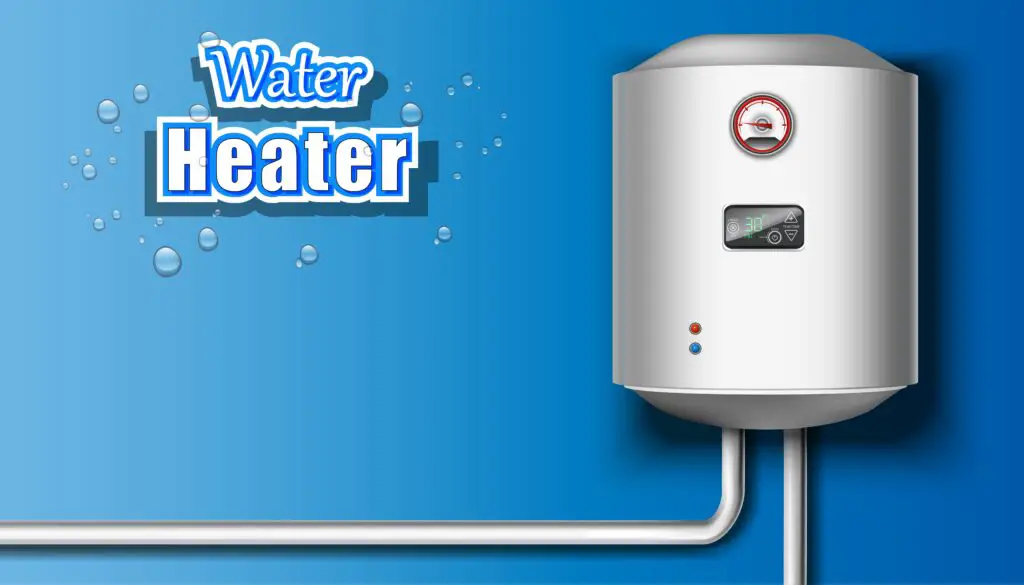
Type
Now that you’ve decided what size you need, your next step is to decide what type of water heater will fit your needs.
Budget
How much can you afford to spend? Decide on this before you narrow down the options, as some types are more expensive than others.
Installation
Some types are easier to install than others. Is this a task you are comfortable and confident to undertake? If not, consider hiring a professional.
Heating Type
The last thing to keep in mind is which type of heating you’ll need. Does your current water heater use gas or electricity? Are you looking for a heat pump or solar-type? These will be instrumental in your future expenses so be sure to consider carefully.
Popular Water Heater Brands
With so many brands producing hot water heaters, you may wonder how to tell which brands are the best. Here are a few of the standouts. Click on the links below to read our reviews on these popular brands.
With so many brands producing hot water heaters, you may wonder how to tell which brands are the best. Here are a few of the standouts. Click on the link to read our reviews on these popular brands.


Water Heater Maintenance Tips
In order to keep a water heater functioning efficiently and lasting for a long time, there are certain issues you’ll encounter. Regular maintenance is also required to ensure a long life for your investment.
Common Water Heater Issues and Troubleshooting
With any equipment, you are bound to have a problem now and again. Here are a couple of common things you may run into.
Water Leaks
Leaking water can come from several sources. Be sure go through each of the steps below to determine where the water is coming from.
● The pressure relief valve keeps pressure from exploding your tank but may need to be replaced if it is leaking
● Check for loose or missing parts
● Make sure your drain valve is positioned correctly and is fully closed
● Crack in the tank
No Hot Water
Ever stepped into a warm shower and been met with an icy stream instead? Here are a couple of things to check if this occurs.
● Pilot light is on if using a gas water heater
● Circuit breaker is tripped or reset button tripped
● Thermostat is set too low
● Burnt out heating element on an electric water heater
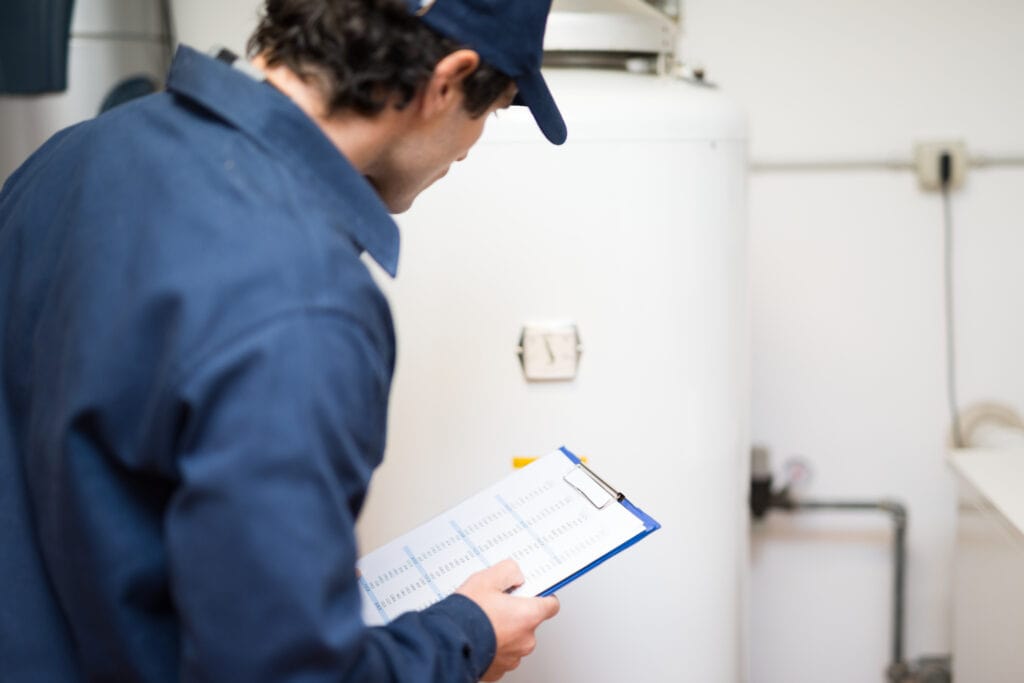
Cold Water Sandwich
With tankless water heaters, this is an issue that means you’ll need to replace your unit. This is when you start out with warm water, then get a burst of cold water, before returning to warm. Contact a repairman to see if this issue is fixable.
Water Taking Too Long To Heat
While some water heaters take longer to heat than others, if yours is taking longer than it usually does, then it’s time to try a couple of things.
● Check your heating element for sediment build-up
● See if your thermostat is set too low
Water is Too Hot
If your water is scalding you, your thermostat likely needs to be lowered. If this does not solve the issue, call a professional.
Discolored or Dirty Water
Most often dirty water is caused by an anode rod that is bad or failing. This repair is best done by a professional, although it can be caused by corrosion on your inner tank as well. If the damage is too severe, you may need to replace the unit.
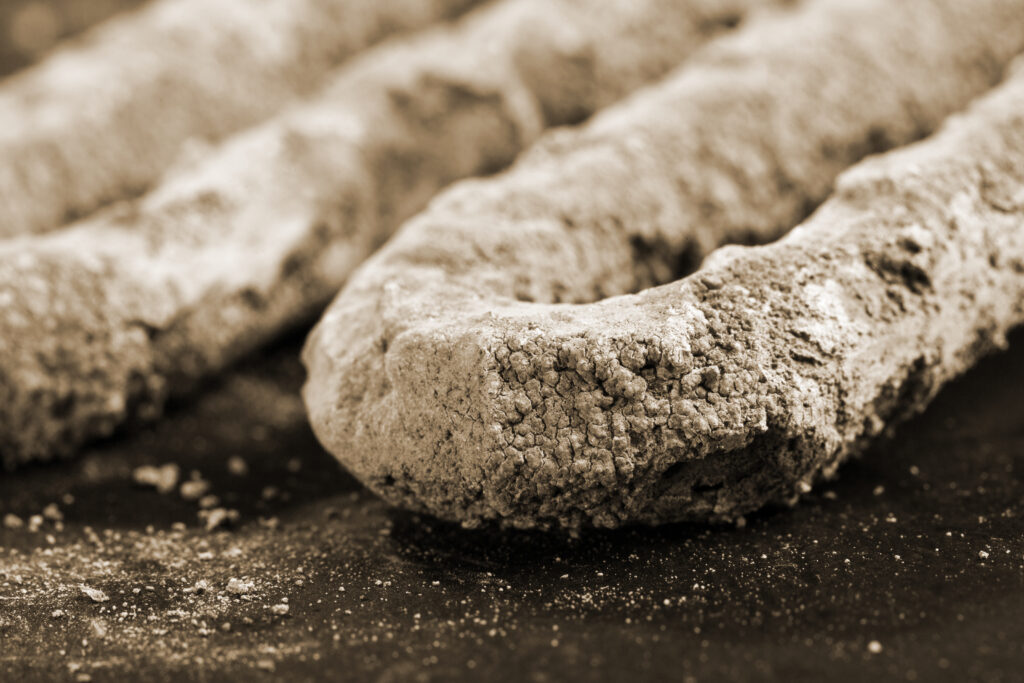
Noisy
Is your water heater is making strange noises? One common cause is due to sediment build up inside your tank. This can be solved by flushing the tank to remove the sediment.
Low Water Pressure
If the water pressure is low, there can be a couple of causes.
● In a tankless heater, you may have too many sources utilizing hot water at once. Turn off all but one to see if pressure returns to normal.
● Check for a blockage somewhere in your system
● Check for leaks around your water heater
● Be sure your shut-off valve is not closed
How to Install a Water Heater
Installing your water heater yourself depends on your level of knowledge and confidence and the type of water heater. Electric water heaters are fairly easy to install, even though it may be time and labor-intensive. Gas water heaters require a bit more caution due to the risk of gas leaks.
1. First, remove the old unit. Carefully drain the unit, disconnect all parts, and ensure electricity and gas are turned off and disconnected. Be sure to dispose of your unit properly
2. Position the new unit. A drain pan underneath is recommended as protection to your floor
3.Ensure all connections will reach with plenty of room to spare
4. Prepare your copper pipes. Use sandpaper cloth to remove any sharp edges
5. Open the junction box to access wires and follow the instructions for your unit and/or label tags
6. Connect both the hot and cold water lines. Be sure to mark each so you can remember which is which
7. Check for leaks by opening a nearby hot water tap and turning on the cold water supply
8. If no leaks, allow tank to fill, continuing to monitor for new leaking
9. Attach the temperature and pressure relief valve. Note: This requires soldering
10. Turn on the electricity and bleed hot water lines
For a detailed visual, check out the video below. Click on the link to learn more about maintaining a tankless water heater.
How to Clean a Water Heater
Cleaning a water heater isn’t very difficult. Here is how you go about it.
1. The first step is to drain your water heater. Locate your drain valve and hook up a hose
2. Turn off the gas (if applicable) or shut off the circuit breaker to your electric water heater
3. Turn off cold water supply
4. Run the hose to a drain or outside. Note: The water draining will be HOT
5. Open a hot water tap nearby to make sure little or no water comes out. Leave the tap open
6. Open the drain valve to allow water to begin flowing
7. Open the pressure relief valve after water begins draining
8. Turn on cold water supply for 10-20 seconds at a time to stir up any sediment then shut off the water supply and allow to drain
9. Repeat the previous step 3-5 times
10. If water stops draining, there may be a blockage. Detach hose and clear blockage to restore flow.
11. Close the drain valve and remove hose
12. Watch for leaks for a few minutes
13. Turn water supply on and allow the tank to fill
14. Close pressure relief valve
15. Close the tap
16. Lastly, relight your pilot and turn on your breaker
For a better look at how to do this, check out the video below.
How Often Should I Clean a Water Heater?
Keeping your water heater clean will help it operate effectively and keep you from many unexpected and unnecessary issues. This process is recommended every 6-12 months, although if you live in an area with hard water, you may need to do this more often.
By regularly cleaning and flushing your water heater, you will know how much sediment is built up, and keep all parts functioning properly. Neglecting to perform this task will shorten the lifespan of your water heater and can cause damage to your unit.
When is it Time to Replace My Water Heater?
Obviously if your water heater is not working at all, it is time to replace. But what are some other signs that it is time?
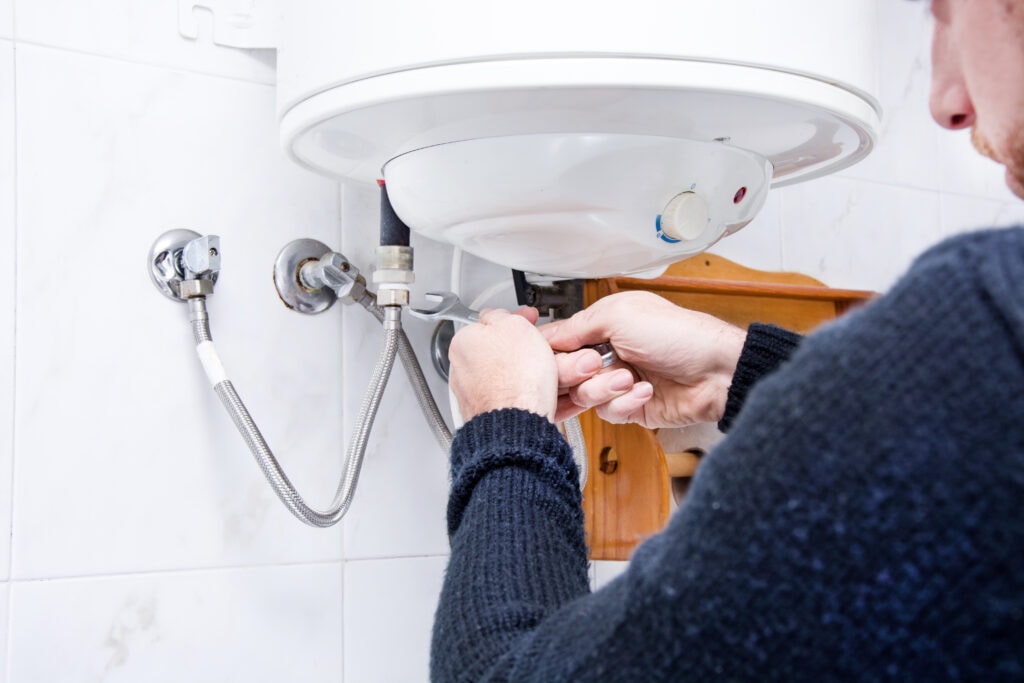
1. If Your Tank Is Rusting
If you can see the outside of your tank rusting, there’s a good chance the inside is as well. Rust will weaken the walls of your water heater and cause sediment in your water.
2. Your Water Heater is 10 Years or Older
The lifespan of most water heaters is 8-10 years (6-8 for gas units) so if yours is older, it’s time to eye a replacement before it goes out and leaves you in a bind.
3. It’s Making a Lot of Noise
Sediment causes noises and so can a bad pump. If you’ve flushed your water heater and it’s still making odd sounds, it may be on its last legs.
4. A Leak You Can’t Seem To Stop
If you’ve tried every trick in the book and your water heater is still leaking, it is time to look for a replacement. Some water leaks can be repaired and calling a professional out is a good first step if you are unsure.
Other signs include: your water isn’t getting hot enough, the pilot light won’t stay lit, or there is obvious damage to the water heater, these are all indications it likely needs to be replaced. Anytime you are unsure, calling for a professional evaluation is recommended.

Can You Really Find a Quality Water Heater That’s Affordable?
Yes, there are ways to find an affordable option. However, this depends on whether you plan on installing it yourself or will need professional installation.
Installation costs alone can range from $400 to over $2000. This is a large amount for most people. However, if you can’t perform this yourself, you may need to go this route. In this case, shop around. Get several estimates and ask for recommendations from friends and family.
If you can install it yourself, it is as simple as figuring out what you need, what brand you prefer, and then shopping around. Check out our water heater buyer’s guide to learn about some of the best options on the market today.
Conclusion
Buying a water heater can be a daunting process so hopefully, this article has helped you understand more about these necessary conveniences.
If you want more water heater information, feel free to browse around to find more brand reviews, informational articles, and accessories. Thanks for stopping by!

HVAC Training 101 is a participant in the Amazon Services LLC Associates Program, an affiliate advertising program designed to provide a means for us to earn fees by linking to Amazon.com and affiliated sites. Pages on this site may include affiliate links to Amazon and its affiliate sites on which the owner of this website will make a referral commission
